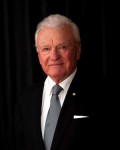Samuel Belzberg is being honored as a “leading man” on Nov. 16 in Toronto. (photo from Weizmann Institute)
When Weizmann Canada’s Leading Men Gala is held Nov. 16 in Toronto, Samuel Belzberg will be one of the 10 honorees and the only one from Western Canada. Vancouver-based Belzberg will be in the audience of 500 that night and he and other honorees will address the audience in a video presentation, revealing their thoughts, comments and inspiration.
“We’ve never had an event on this scale before,” said Susan Stern, national executive director for Weizmann Canada. “But it’s our 50th anniversary and we wanted to do something really special.” The national event has an ambitious financial goal of raising $5 million to support the Weizmann Institute of Science in Rehovot, Israel. Speakers include actor William Shatner and Prof. Oded Aharonson, who will deliver a multimedia presentation about his research on extraterrestrial oceans.
Stern said she expected the dinner to sell out, adding that tables start at $50,000 and that there are various levels of sponsorship.
In selecting the honorees for the gala, Weizmann Canada’s goal was to find individuals who had distinguished themselves as leaders in their field, who understood the value of giving back and who had done something special in areas of research that were close to their hearts. Belzberg was an easy choice.
Founder and chairman of Gibralt Capital Corp. and Second City Real Estate, his two companies manage and own more than $500 million of real estate and capital investments. Back in 2001, he created Action Canada, which, in partnership with the federal government, endows 20 fellowships each year to Canadians who want to make a difference in the world.
It’s easy to look at the dollar figures his companies represent and assume that life has been just rosy for Belzberg, a father of four who boasts 16 grandchildren and eight great-grandchildren. But look a little deeper and it becomes clear that every family has its own unique battles. In Belzberg’s case it was the illness of one of his daughters, Cheri, who was diagnosed with dystonia, a neurological disorder that impacted her mobility and speech. Back in the 1970s, when doctors were trying to diagnose her condition, finding the right diagnosis took four to five years. “Nobody knew the first thing about it in those days,” he said.
Belzberg would change that, establishing the Dystonia Foundation with neurologist Stanley Fahn in 1976. The foundation has made significant contributions to clinical and diagnostic treatments though, sadly, none of them helped Cheri. Still, Belzberg is encouraged by the progress in research and the fact that it has given thousands of people cures for the disorder, as well as counseling and support.
“We have now learned that there are many different types of dystonia and we’ve been at the forefront of learning about them and finding either cures or short-term help,” he said. “For example, there’s a kind of dystonia that’s like writer’s cramp, or where a musician all of a sudden couldn’t play the piano.”
Belzberg has established many other initiatives, too. “He’s done so much for the community, locally, nationally and internationally – it’s unbelievable,” Stern said. In 1977, he created the Simon Wiesenthal Centre and the Museum of Tolerance in Los Angeles. The mission of the centre is to confront antisemitism, promote human rights and ensure that the Holocaust is never forgotten.
Belzberg, however, credits his success to picking the right partners for his projects. “It’s relatively easy to donate money, but it’s not so easy to take your time and actually work at a project,” he admitted. “I’ve been very lucky in that I’ve picked good partners. They carry the ball and I help the best way I can.”
He added that his involvement with Weizmann Canada over the years was prompted by a belief that the Weizmann Institute “is among the greatest institutes in Israel. The scientists at Weizmann have accomplished so much, and it’s a great honor to be playing a small part in moving the research forward.”
Lauren Kramer, an award-winning writer and editor, lives in Richmond, B.C. To read her work online, visit laurenkramer.net.

